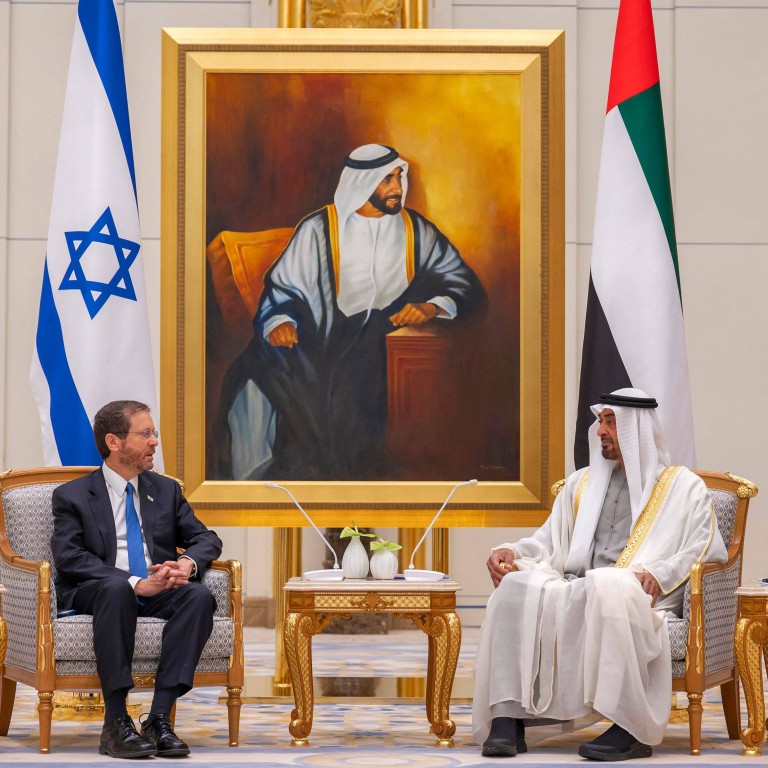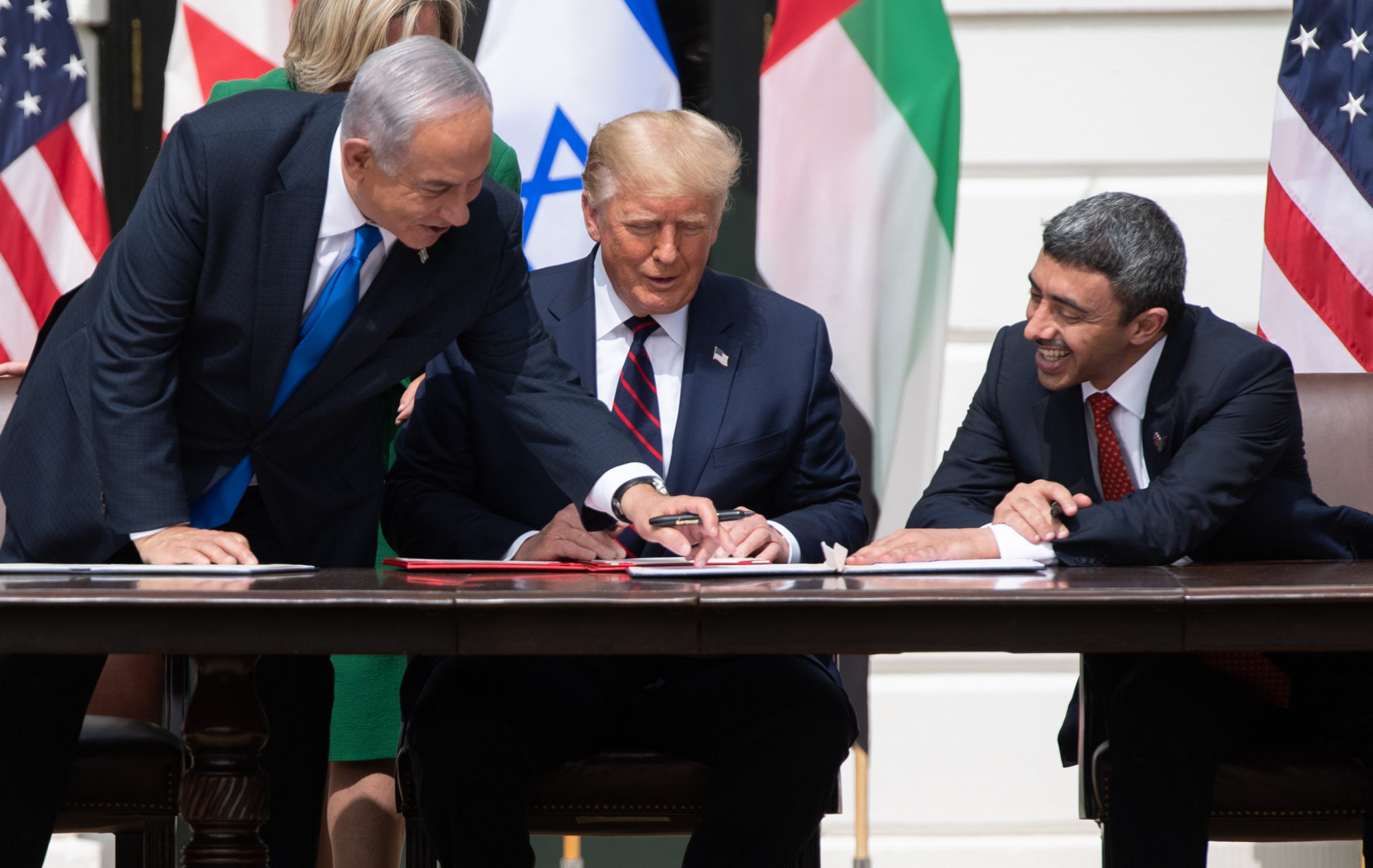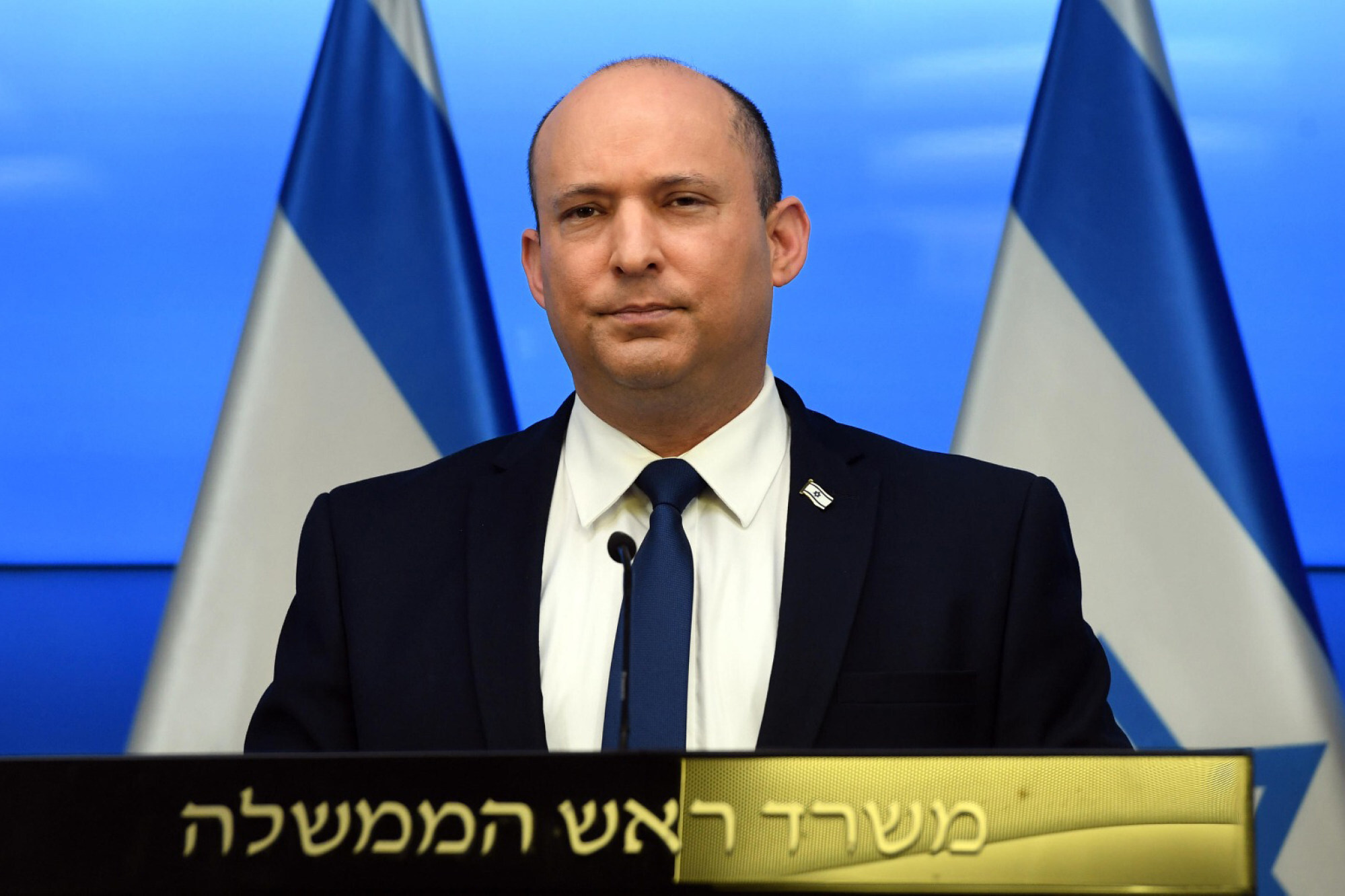
Israel-UAE ties grow as US pushes allies to cut back on China relations
- Since normalising relations in 2020, Israel and the UAE have forged ahead with an ever-closer partnership built on investment and a shared distrust of Iran
- Washington wants its allies to turn to each other for support instead of Beijing – but observers say China ties are still crucial for both Middle East states

Yet the Emirati money heading Israel’s way isn’t entirely new, according to Israeli analyst Carice Witte, who said the investments announced since the signing of the Abraham Accords instead represent the formalisation – and multiplication – of the “massive amount of business that had been taking place under the table”.
Rather than some grand plan hatched by Washington, Witte – who is founder and executive director of the Sino-Israel Global Network and Academic Leadership think tank – said it was “a natural development” for the UAE to emerge as an alternative source of investment and technology development cooperation for Israel.
Israel steps up scrutiny of Chinese investments under pressure from US
“A colleague in the US State Department said that it is a nice result, but assuming the US government planned it is attributing [Washington] with undeserved long-term strategic thinking,” she said.
“Israelis and Arabs do not have the cultural or language barrier that exists with China. More than half of Israel’s Jewish population is Misrachi – hailing from Arab countries as well as Iran and Turkey. Thousands of Israelis speak Arabic compared to the handful who speak Chinese.”
In addition to such connections, the speed with which Israel and the UAE have strengthened ties outside the accords’ framework reflects an urgent desire to close ranks against their common nemesis.
Iran concerns
Diplomatic momentum between Abu Dhabi and Jerusalem built as they eyed Iran’s attempts to revive the 2015 nuclear deal known as the Joint Comprehensive Plan Of Action (JCPOA). Tehran restarted talks with world powers on the arms control treaty last year.
Shared concerns about the threat posed by Iran and its regional proxies were highlighted by four ballistic missile and suicide drone attacks launched against the UAE between January 17 and February 2 by Yemen’s Houthi militia and a shadowy Iraqi group believed to be backed by Tehran.
Herzog’s decision not to cut short his trip on security grounds reportedly came as Abu Dhabi was telling the officials and businessmen accompanying him of its desire to plough some US$1 billion a year into Israel’s economy over the next decade.
Houthi missile blown out of sky over UAE during Israeli president’s visit
Neither government has commented on reports that the UAE would initially channel US$200 million a year in investments through the Abu Dhabi Development Holding Company (ADQ).
Two other Emirati sovereign wealth funds, Abu Dhabi Investment Authority and Mubadala Investment Company, are also prospecting for opportunities in Israel, according to Bloomberg and Al-Monitor.
UAE wealth funds have accrued in excess of US$1 trillion from the proceeds of oil exports since the 1970s, insulating the country of 10 million from periodic price shocks and enabling it to project outsize influence on the international stage – making it a significant player in the US-led regional alliance again Iran.
Eye-catching investing
The UAE first unveiled its US$10 billion plan to “invest in and alongside Israel, across sectors including energy manufacturing, water, space, health care and agritech” almost a year ago.
But months of political wrangling that followed Israel’s general election results in March 2021 delayed its implementation.
In the meantime, Abu Dhabi lined up a number of other politically eye-catching investments.

In October, Mubadala spent US$1.1 billion to acquire a 22 per cent stake in Israel’s Tamar offshore gas field, boosting prospects for investment by hitherto reluctant Western energy giants.
Reportedly acting on a request by Bennett, the UAE also used its money and influence to help thaw long-frozen relations between Israel and neighbouring Jordan.
In November, state-owned Emirati renewable energy firm Masdar signed agreements under which it will invest US$300 million to establish a 600-megawatt solar power project in Jordan by 2026.
Electricity generated by the project would be sold to Israel which, in return, is to construct a desalination plant on its Mediterranean coast to pipe 200 million cubic metres of water a day to parched Jordan, quadrupling what it currently receives.
Middle East power play tests US, casts spotlight on China’s manoeuvres
Then in January, Emirati fund Mubadala invested US$100 million in six Israeli venture capital funds focused on the country’s technology start-up sector, which attracted US$26 billion in foreign funds last year.
Defensive partners
Hussein Ibish, a senior resident scholar at the Arab Gulf States Institute in Washington, said the UAE was looking to establish a partnership with Israel “on multiple fronts, including in hi-tech, with an eye to both commerce and security”.
“Both are small countries with limited populations but large regional roles and significant vulnerabilities including very limited strategic depth,” he said.
Israel’s defence industry is easily the most advanced in the Middle East, and the UAE is working on developing its own independently.
Both of their militaries rely heavily on signals and imagery intelligence, missile-defence systems and surveillance technology. They both also focus spending on electronic and cyber warfare.
It’s really a partnership, and Israelis have found themselves welcomed enthusiastically in Abu Dhabi
“The UAE had been looking for a regional partner on these fronts and only Israel was a viable candidate,” Ibish said. “So solidifying this relationship is important to UAE strategic concerns and national security policy as well as a potential economic boon.”
Meanwhile, the UAE offers Israel “an important foothold in the Arab world, offers the prospect of a strategic presence in the Gulf and helps to break through Israel’s lingering global isolation,” he said.
Unlike earlier “cold” peace agreements that Israel signed with Egypt and Jordan, Ibish said “the partnership with the UAE is the first diplomatic relationship Israel has developed in the Arab world that is a ‘warm’ one.”
“It’s really a partnership, and Israelis have found themselves welcomed enthusiastically in Abu Dhabi and Dubai,” he said.
Indonesia plays down upswing in Israel ties, amid talk of ‘normalisation’
As with other US allies, Washington has been pushing for the UAE and Israel to find alternatives to China for investment and technology flows, and their new-found friendship could be a “potential part” of that, Ibish said.
“But both Israel and the UAE will want to tread lightly in that regard,” he said. “Both countries have sought to build closer relations with China, in part because of its global significance, especially in terms of investments, but also in the expectation that China is inexorably rising as a global power that will accumulate a bigger footprint in the Middle East and the Gulf region.”
Another motivation, shared by Saudi Arabia and others in the region, is countering Iran’s influence in Beijing, and preventing “the main Middle Eastern and Gulf voice in China being a Persian one,” Ibish said.

